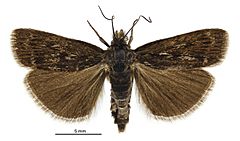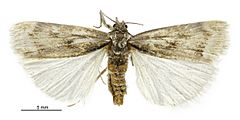Orocrambus cultus facts for kids
Quick facts for kids Orocrambus cultus |
|
|---|---|
 |
|
| Male | |
 |
|
| Female | |
| Scientific classification | |
| Kingdom: | |
| Phylum: | |
| Class: | |
| Order: | |
| Family: | |
| Genus: | |
| Species: |
O. cultus
|
| Binomial name | |
| Orocrambus cultus Philpott, 1917
|
|
The Orocrambus cultus is a small moth that belongs to the Crambidae family. It was first described in 1917 by a scientist named Alfred Philpott. He studied specimens collected by Merlin Owen Pasco.
This moth is special because it is endemic to New Zealand. This means it can only be found naturally in New Zealand and nowhere else in the world. It is known to live around Cecil Peak, a mountain in the South Island.
Contents
Meet the Orocrambus Cultus Moth
The Orocrambus cultus moth is a fascinating insect. It was discovered over a hundred years ago. Scientists learn about new species by carefully observing and collecting them. This helps us understand the amazing variety of life on Earth.
What Does it Look Like?
This moth is quite small. Its wingspan is about 20 mm. That's roughly the size of a small coin. The front wings, called forewings, are a deep yellowish-brown color. They have darker, dusky black markings. These markings are found along the costa, which is the front edge of the wing, and the dorsum, which is the back edge.
Where Does it Live?
The Orocrambus cultus moth calls New Zealand its home. It is a native species there. Specifically, it has been found near Cecil Peak. This area is known for its unique natural environment. Being endemic means it's a special part of New Zealand's wildlife.
When Can You See It?
Adult Orocrambus cultus moths have been seen flying around in January. This is summer in New Zealand. Moths are often most active during warmer months. Seeing them on the wing means they are flying around, usually looking for mates or food.
 | May Edward Chinn |
 | Rebecca Cole |
 | Alexa Canady |
 | Dorothy Lavinia Brown |

